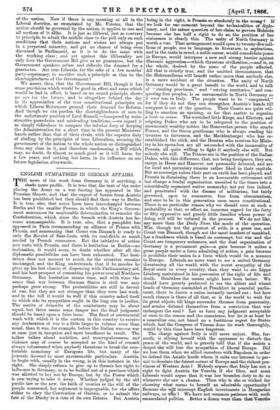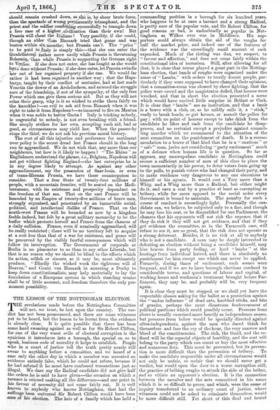ENGLISH SYMPATHIES IN GERMAN AFFAIRS.
THE news of the week from Germany is, if anything, a itil:Tlhaile more pacific. It is true that the text of the order placing the Army on a war footing has appeared in the Prussian Gazette, and -that the export of horses from Austria has been prohibited led they should find their way to Berlin. It is true, also, that notes have been interchanged between Berlin and -the smaller Powers, in which the King's Govern- ment announces its unalterable determination to remodel the Confederation, which since the breach with Austria has be- come unmanageable. It is true, also, that a pamphlet has appeared in Paris recommending an alliance of France with Prussia, and announcing that Count von Bismark is ready to -cede the 'strict of Saar-louis, with its coal-fields so much needed by French commerce. But the initiative of action now Teets with Prussia, and there is hesitation in Berlin—an inclination, it would seem, to doubt whether after all the diplomatic possibilities can have been exhausted. The hesi- tation does not amount to much, for the situation remains unchanged, and the King understands that if he recedes he gives up his last chance of dispensing with Parliamentary aid, and his best proved of cementing his powerover all Northern Germany. But hesitation means time, and with time the sense that war between German states is civil war may perhaps grow strong. The probabilities are still in favour of war, but they are not stronger than they were last week, and in the lull it would be well if this country asked itself to which side its sympathies ought in the long run to incline.
he merits or demerits of the combatants may be about equal, but them seems some danger lest the final judgment ehould be based upon a false issue. The flood of sentimental wash with which it is the custom in this country to receive any declaration of war is a little larger in volume even -than usual, -than it was, for example, before the Italian war—a war at once just in inception and most beneficent in result. The talltee talkee about ambition, and unscrupulousness, and violence may of course be accepted as the kind of remark always volunteered when anybody threatens to break the com- fortable monotony of Eurapean life, but many of the journals descend to most unreasonable particulars. Austria, to begin with, usually in the wrong, is in this instance in the -right. She simply refuses to give up to threats her right to influence in Germany, or to be bullied out of a province which was allotted to her not by Europe, but by the Power which is now trying to take it away. Whether judged by the old public law or the new, the faith of treaties or the will of the people concerned, her argument is impregnable, for she offers -either to obey the Convention of Gastein, or to submit the fate of the Duchy to a vote of its own Dilates. But Austria being in the right, is Prussia so absolutely -in the wreizg ? If we look for one moment beyond the technicalities of diplo- macy, and the minor question of her claim to govern Holstein because she has half a right to do so, the position of her statesmen is clearly this. The unity of North Germany is worth a war. That arrangement would open to twenty--five mil- lions of people, one in language, in literature, in aspirations, and in the main in creed, a noble career, would consolidate peace in Europe, would interpose a new and strong barrier against- Slavonic aggression—which threatens eivilization,—and is, on the whole, desired by the mass of the people affected. All that is strictly true, and the omitted circumstance, that the Hohenzollerns will benefit rather more than anybody else, is a mere accident of the situation. The unity of North Germany would be a great benefit to the world, and to talk of "stealing provinces," and "relying territories," and con- quering free peoples, is as unreasonable in North Germany as it ever was in Italy. The people want to be "conquered," for if they do not they can strengthen Austria's hands till conquest is out of the question. Their Courts are quite wil- ling to sanction an uprising, or for that matter to organize a levee en masse. The wretched little Kings, and Electors, and reigning Dukes who are to be relegated to the position of enormously wealthy nobles, the Hanoverian person who courts France, and the Saxon gentleman who is always sending his treasure to fortresses, and the Mecklenburger who has re- established the stick, and the Hessian who receives his Minis- try in his opera-box are all astounded with the immorality of Prussia, all quite willing to fight if anybody else will. But nobody else will. The Princes are in the position of the Italian Dukes, with this difference, that, not being foreigners, they are, except in Hesse and Hanover, not personally detested, and are for local and pecuniary reasons rather liked in their capitals. But as sovereign rulers their part on earth has been played, and Prussia in dismissing them to an honourable retirement will but change a feudal organization unsuited to the times into a scientifically organized native monarchy, not yet free indeed, and penetrated with the disease of militarism, but fairly governed, open to commerce, free from obscurantism, and sure to be in -this generation once more constitutional. There is no particular reason why we should rave at such a probability as that, or affect an immense regard for the forty or fifty -oppressive and greedy little families whose power of doing evil -will be reduced in the process. We do not like, any more than the Daily Hew, the mode of the operation. War, though not the greatest of evils, is a great one, and Count von Bismark, though not the most insolent of mankind, has a frankness which is based on contempt, but war and the Count are temporary nuisances, and the dual organization of Germany is a permanent gain—a gain because it unites a great people under a form admitting of action, a gain because- it prohibits their union in a form which would be a menace to Europe. Liberals no more want to see a united Germany threatening all the world, with the secret sympathy of the- Royal caste in every country, than they want to -see Lippe Liraberg maintained in his possession of the right of life and death. Doubtless the means might have been better. We should have greatly preferred to see -the ablest and wisest heads of Germany assembled at Frankfort in peaceful parlia- ment, there to decree a union instantly carried out ; but how much chance is -there of all that, or is the world to wait for its great objects till kings surrender thrones from generosity, and armies disband themselves from a conviction -that war endangers the soul ? Let us form any judgment acceptable at once to the reason and the conscience, but let it at least be a masculine one, not based on a factitious regret for States which, had the Congress of Vienna done its week thoroughly,_ would by this time have been forgotten.
The charge against Italy is still more unjust. She, for- sooth, is allying herself with the oppressor to disturb the peace of the world, and is gravely told that if she assists a. despot she will lose the sympathies of liberal Europe. Did we lose them when we allied ourselves with Napoleon in order to defend the Asiatic horde whom it snits our interest to per- mit to desolate the fairest corner of Europe and the richest pro- vinces of Western Asia ? Nobody argues that Italy has not a. right to fight Austria for Venetia if she likes, and most Liberals would argue that it -was her bounden duty to do so whenever she saw a chance. Then why is she so wicked for choosing what seems to herself an admirable opportunity ? Because she will interrupt English investments in Hungarian railways, or wry? We have not common patience with such emasculated politics. Better a dozen wars than that Venetia should remain crushed down, as die is, by sheer brute force, than the spectacle of wrong peanently triumphant, and the priest and the soldier combaig successfully to trample down a free race of a higher/civilization than their own! But Prussia will cheat the Italians 1 Very possibly, if she could, though an abler in Bismark tried that game and was beaten within sixamontirs; but animas can't. The "price" to be paid torItaly is simply this—that she can enter the Quadrilateral- Tether more easily while Prussia is threatening Bohee • -than while Prussia is supporting the German right to Vei. cc. If she does not enter, she has fought as she would ile4f e done without Prussia; if she does enter, let Peusaia swindle 'her out of her regained property if she can. We would far rather it had been regained in another way ; that the Haps- burp, taught by their conflict of centuries, had at last made Venetia the dower of an Archduchess, and entered the struggle sure of the friendship, if not of the sympathy, of the only free Power which can give them serious aid. But as they wilLnot relax their grasp, why is it so wicked to strike them fairly on the knuckles ?—so evil to ask aid from Bisinark when it was right to take it from Napoleon1—so immoral to fire on Mantua when it was noble to batter Gaeta 1 Italy is tricking nobody, is ungrateful to nobody, is not even breaking with a friend. She simply strikes for her own, accepting such aid, bad or good, as circumstances may yield her. When the passer-by stops the thief, we do not ask his previous moral history.
The root of all this injustice and preference for sentiment over policy is the secret dread lest France should in the long run be aggrandized. We do not wish that, any more than our neighbours, but how is it likely to happen ? "The Rhine" as Englishmen understand the phrase, i.e., Belgium, Napoleon will not get without figliting England—the last enterprise he is in any degree likely to attempt. As against any .other aggrandizement, say the possession a Saar-louis, or -even of trans-Rhenan Prussia, we have these counterpoises to consider. That a free State of twenty-four millions of pecple, with a mountain frontier, will be seated on the Medi- terranean, with its existence and prosperity dependant on the freveredetomFof toehat sea. beThboaoatodnedthase east FranceFbryanace will be strongly organized, and penetrated by an immovable social, bounded by an Empire of twenty-five wanions of brave men, political, and intellectual dislike of France. That on the x&orthfeeble indeed, but felt by a great military monarchy to be the buffer which protects herself and France from the chances of a daily collision. France, even if nominally aggrandized, will be really restricted ; there will be no territory left to acquire at a cost less than that of a war for existence, and peace will be preserved by the visibly fearful consequences which will follow its interruption. The Government of corporals at Berlin is no pleasanter to us than to any other Liberals, but that is no reason why we should be blind to the effects which its action, selfish or sincere, as it may be, must ultimately produce. "Blindly the wicked work the righteous will of Heaven," and Count von Bistaark in annexing a Duchy to keep down constitutionalists, may help materially to lay the foundation of a European system in which standing armies shall be of little account, and freedom therefore the only per- moment possibility.































 Previous page
Previous page